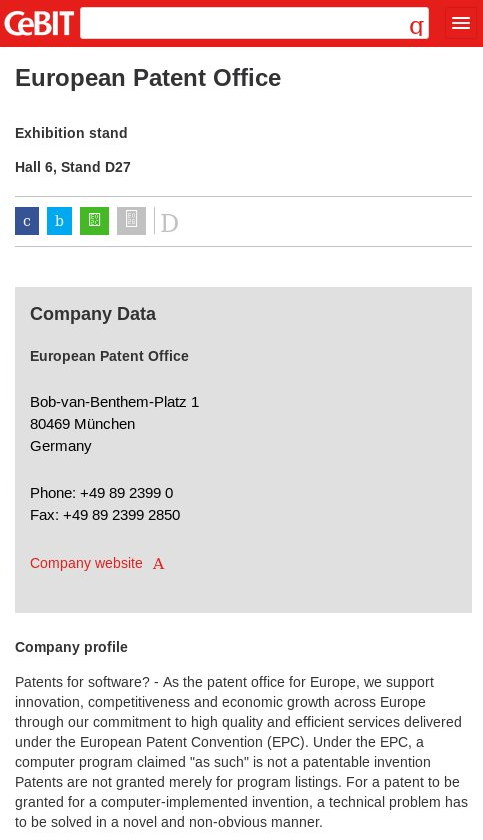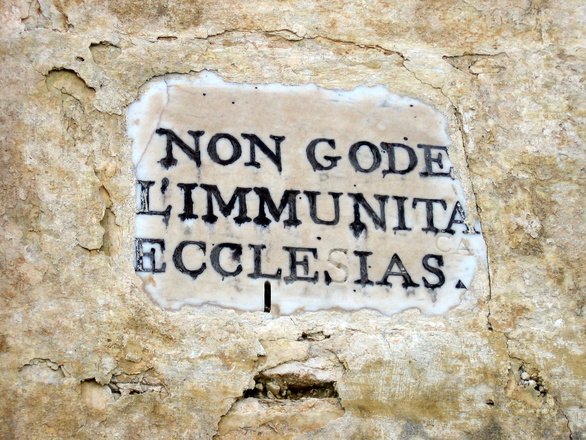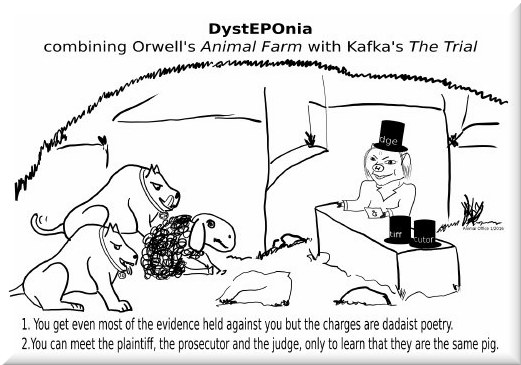02.04.16
Posted in Europe, Patents at 8:02 am by Dr. Roy Schestowitz
The current media strategy is to pretend nothing is amiss and work on media presence by sending journalists various new (carefully prepared in-house) puff pieces

Summary: The PR strategy of the EPO, whose destructive patent strategy continues unabated (for now), latches onto Colombia and strives to manufacture mythology wherein the public, patent examiners and patent applicants are all very happy with the EPO
THE situation in Europe is rather grim when it comes to patents. The EPO has not yet had any executive subjected to legal procedures, even though violations on European soil were well recorded (documented in the media, too). Moreover, the EPO is still promoting software patents this week. That’s what virtually all patent trolls are relying on.
Based on this new article: “Some of Europe’s biggest producers of intellectual property are teaming up to battle for rules that’ll help them cash in better on innovation. Telecommunications network builder Ericsson AB, plane maker Airbus Group SE, French phone company Orange SA and train maker Alstom SA are among companies behind IP Europe, a consortium due to be unveiled today in Brussels.”
Ericsson is actually behind some big patent trolls. We already gave some examples of Europe attracting patent trolls and Ericsson has a lot to do with it, Nokia too. “Ericsson to promote patent trolling at the European level, hardcore pro-swpat,” (software patents) the FFII’s President wrote yesterday (citing the article above).
Over at IP Kat, where many EPO workers comment anonymously, one person wrote:
I am really struggling to understand something, and so I turn to the good readers of IPKat for help.
When reporting “production” figures for 2014, Monsieur le President was quoted as saying “Our production, our productivity and our cost controls have all improved”. I also understand that the accounts of the EPO have shown a healthy surplus for the past few years.
Thus, based upon its own publications, we can conclude that the EPO has achieved both a healthy “profit margin” and a reduction in underlying costs (of production). Right?
So why (as always) are fees increasing this year? That is, how come the users of the system (who, after all, fund the whole shooting match) do not benefit from the apparently improved productivity?
Answers on a postcard, please.
The EPO is operating as though it’s a business, not a service, maximising profit and making it harder for European SMEs to get patents (prices go up). The Banana Republicans of EPOnia now visit South America and then publish total hogwash about it. Battistelli, who is probably as beneficial to the region as Pinochet was (see this recent article in English and in Spanish), said yesterday: “In addition, we were able to sign a Patent Prosecution Highway (PPH) agreement in Bogota between the EPO and Colombia’s Superintendent of Industry and Commerce, a measure made possible since we furthered ties through a framework cooperation agreement in 2014. The conclusion of the PPH pilot programme will prove essential for promoting access to accelerated patent prosecution. It is anticipated that this, in turn, will foster business growth between our two regions and boost co-operation between our Offices, bringing additional benefits to European patent holders outside of Europe. It is also envisaged that such agreements will greatly support the timely acquisition of patent rights with our users, such as the university researchers and innovators from industry and business I had met just the day before signing the agreement. It was also clear from the intense media interest that these were measures of interest to a wide variety of actors in innovation, business and industry.”
Has anyone noticed that Monsieur le President now spends more time in countries such as China and Colombia rather than Western countries? Some months ago we were told that he had cancelled his trip to Zagreb, where his bulldog Topić reportedly face many criminal charges (more on that tomorrow).
Keeping up the pretense of quality and compliance, the EPO has also just published details about this effort to create an illusion of support from stakeholders, piggybacking ISO [1, 2] despite its rigging (credentials and accreditation for sale). As we wrote here earlier today, there are other such propaganda efforts underway (in Rijswijk). Prepare for the EPO storming the European press with blatant lies and spin. █
Permalink
 Send this to a friend
Send this to a friend
Posted in America, Patents at 7:13 am by Dr. Roy Schestowitz
The misleadingly-named Trade Commission does it again

Summary: The International [sic] Trade Commission is meddling in competition and allowing a US giant, Cisco in this case, to potentially block rivals (no imports from abroad) using software patents
EMBARGOES do not support or motivate innovation. They’re weapons of blackmail. They limit choice in the market (expect price hikes) and create an atmosphere of fear that discourages companies (or their engineers) from implementing all sorts of useful features.
The ITC says Arista Networks violated three Cisco software patents. But software patent are not valid in Europe, many of them are not valid in general (not even in the US), and trends suggest that many software patents are invalid (once presented and assessed before a court). Is US patent law the universal law now? It seems so. See yesterday’s coverage of this patent spat [1, 2, 3, 4, 5, 6, 7, 8, 9, 10, 11, 12, 13, 14, 15, 16, 17, 18, 19, 20]. We don’t have time to deal with each article individually, but we just wish to point out that in its entire history the ITC rarely (if ever) helped a non-US company block imports of products by a US corporation. The word “international” in “International Trade Commission” is highly misleading. It’s like calling the EPO “European” when most of its favourite clients are not European. The ITC is imperial by intent/design; it’s a US apparatus of power masquerading as international. Microsoft has history banning rival mice using patents and ITC for sanctions. That’s how it started for Microsoft, which has gotten worse (more aggressive with patents) since then. Apple too is trying to gain advantage over mostly Asian companies (Apple’s products too are made in Asia and imported from Asia) through ITC sanctions. All in all, the ITC has a proven track record of helping US mega-corporations embargo/ban foreign rivals. It needs to stop. See the article “International Trade Commission pens patent love letter to Cisco” and the article “Cisco ruling could lead to ban on Arista tech imports” (import bans likely imminent). Cisco, as a reminder, is a facilitator of an empire’s back doors. Cisco used to openly advertise these back doors, but now it shies away from such negative publicity (because of Snowden’s leaks).
Who really benefits from all this? █
Permalink
 Send this to a friend
Send this to a friend
Posted in Deception, Europe, Patents at 6:30 am by Dr. Roy Schestowitz
“It is difficult to get a man to understand something when his salary depends upon his not understanding it.” ~Upton Sinclair

Summary: The views of some of our readers regarding reluctance in the German media to challenge the EPO’s violations of German law, probably because Germany benefits from being a host nation of the EPO
As a frequent media critic (more evident/visible in my social media accounts than in this Web site), I have come across plenty of evidence of censorship and self-censorship in the European media. Some links about that are being shared daily (under, e.g., the “Censorship” category in our daily links). Techrights itself is subjected to site-wide censorship by the EPO right now. I experienced both censorship and self-censorship when I worked for a publisher one decade ago (my editor removed or watered down paragraphs of mine which were critical of an occasional sponsor, Microsoft). There are serious issues in the editorial/publication process that not many people are generally aware of. If one suspects that censorship takes place, it will often turn out to be the case (even if there is no admission as nobody likes to admit suppression of free speech). Even WIPR, which frequently covers EPO matters, did it some months ago (censorship of criticism of the EPO, due to pressure from management).
“Even WIPR, which frequently covers EPO matters, did it some months ago (censorship of criticism of the EPO, due to pressure from management).”Let’s face the reality of corporate media; in order to be financially viable someone must benefit financially, and it’s not always just the advertisers (to whom access to readers/audience is effectively sold). There is agenda to be delivered for some people’s financial gain (not just through advertising of products but of policy).
Germany’s media outlets are no exception to this problem. Take the European Union for instance. Germany benefits from it financially (weapons trade, austerity in Greece and various loans inside the EU come to mind), so it doesn’t wish to criticise it too much. I personally support the European Union and I even have a booklet in support of the European Union, given to me 17 years ago by the German Consulate.
“Much of the media supports the EPO by silence, i.e. by not covering all the negative stories coming out of the EPO.”Germany’s media is not likely to bash the European Union to the same degree that the British media sometimes does (just see what the Daily Mail has just published in its front page/cover). Germany is at the very heart of the European Union. It cannot criticise the US too harshly, either (see for example “European media writing pro-US stories under CIA pressure – German journo”). To cite this article from a very prominent media person (check his career profile), former CIA Director William Colby is quoted as saying that the “CIA owns everyone of any significance in the major media.”
As we’ve just noted, the EPO works for corporations, not for Europeans. It just has the word “European” in its name. It should thus be seen as unsurprising that the corporate media will typicaly be biased in favour of the EPO. Much of the media supports the EPO by silence, i.e. by not covering all the negative stories coming out of the EPO.
Here is what some readers told us yesterday:
We wanted to make a few observations in response to your recent posting about the article “Es kracht an allen Ecken und Enden” which appeared in the Münchner Merkur on 21 January.
The article is written by Thomas Magenheim-Hörmann, a Munich-based journalist who writes for the Münchner Merkur, a regional daily for Munich.
His articles are normally distributed and reproduced Germany-wide in other regional dailies such as the “Oberbayrisches Volksblatt”, “Frankfurter Rundschau”, Berliner Zeitung”, “Stuttgarter Zeitung”, “Badische Zeitung”, “Pfälzischer Merkur”, etc.
For example:
„Wie bei der Fifa oder in China“
Europäisches Patentamt: Kritik am Chef des Europäischen Patentamtes
Patentrecht: Patent auf Brokkoli
Der soziale Frieden ist zerstört
Verhältnisse wie im Überwachungsstaat
Großer Zoff beim Patentamt
Magenheim-Hörmann’s article about the EPO are well researched and of a superior journalistic quality to what one might normally expect in the regional press.
In recent times he has been giving far better and more penetrating coverage to EPO matters than any of the big German dailies, in particular the Munich-based Süddeutsche Zeitung which seems to have gone completely silent.
What is curious about his most recent article is the fact that it only appeared in the paper version of the Münchner Merkur.
It is not available online on open access (although it seems that it can be found behind a paywall) and it doesn’t appear in any of the other regional dailies or at least it doesn’t seem to turn up in Google searches.
It’s almost as if somebody is trying to impede the circulation of the article.
Some speculation about this:
The latest article “Es kracht an allen Ecken und Enden” focuses on the social conflict at the EPO but in a byline it also mentions the recent “Monsanto melon” incident. The biotech patenting controversy seems to be generating a lot of grass-roots political protest in Germany and in neighboring countries such as Austria and Switzerland. Is it possible that somebody at a high political level is getting nervous about people making connections between the social conflict at the EPO and questionable management policies which seem to be aimed at encouraging biotech patenting ?
The deafening silence from the German media about recent EPO matters and the obvious reluctance of the German courts to question the EPO’s immunity are also suspicious.
On both fronts the response in Germany compares very unfavorably to that in the neighbouring Netherlands (the other main EPO host state) where both the press and the judiciary clearly have less inhibitions about subjecting the alleged abuses of EPO management to justifiable public scrutiny.
Here is an article published today in the UK press which explains how the German media is under strong political influence from the government. It seems reasonable to assume that this also applies to reporting about EPO matters.
In part 2 we are going to deal with further suspicious omissions (or suppressions) in reporting of EPO-related scandals. █
“The reasonable man adapts himself to the world; the unreasonable on persists in trying to adapt the world to himself. Therefore all progress depends on the unreasonable man.” ~George Bernard Shaw
Permalink
 Send this to a friend
Send this to a friend
Posted in Europe, Patents at 4:45 am by Dr. Roy Schestowitz

Summary: The European Patent Office (EPO) uses its attendance at CeBIT, which is a corporate expo, to promote software patents in spite of the European Patent Convention (EPC)
Yesterday morning at around 9AM (CET) the EPO’s Twitter account made it known that it would attend a corporate expo, CeBIT. I quickly linked to that, instantaneously criticising what seemed to be affirmation of the EPO’s now-notorious corporate tendencies. Shortly thereafter we also got mail alerting us or notifying us of the fact that the EPO would be attending CeBIT. The rogue thing, however, wasn’t the attendance itself but the part which said “Company profile” (yes, company, as it’s corporate). It also said “Product categories” (yes, product) and it specifies: “Services and consulting relating to patent protection and trademark protection, intellectual property” (actually, intellectual property is just a vague umbrella term which encompasses different laws, including trademarks, copyrights, and patents, which are inherently different things that oughtn’t be lumped together and treated similarly).
“How low will they stoop in an effort to artificially inflate the number of patents?”The most outrageous thing is how the EPO describes itself. It’s short and bizarre. It’s right there in CeBIT’s site and it talks about absolutely nothing except software patents. It’s a bizarre introduction which sounds more like a lobbyist’s statement, not a mission statement: “Patents for software? – As the patent office for Europe, we support innovation, competitiveness and economic growth across Europe through our commitment to high quality and efficient services delivered under the European Patent Convention (EPC). Under the EPC, a computer program claimed “as such” is not a patentable invention Patents are not granted merely for program listings. For a patent to be granted for a computer-implemented invention, a technical problem has to be solved in a novel and non-obvious manner.”
That takes some nerve to say, especially Brimelow’s notorious “as such”. And notice that they say “program listing”, which, as Benjamin Henrion explained it to me yesterday, just means printout of source code (printing to make it “physical”), then sticking it up on a wall. Is the EPO actively encouraging people to get around exclusion of software patents and giving them tips? Is the EPO so blatant and shameless about ignoring the EPC? How low will they stoop in an effort to artificially inflate the number of patents? Excessive patenting can do more harm than good, for obvious reasons. This includes software patents. █
Permalink
 Send this to a friend
Send this to a friend
Posted in Europe, Patents at 6:45 am by Dr. Roy Schestowitz
…and Why the UPC Would Make Matters Even Worse

Summary: The EPO’s insistence that it remains above the law is not only coming under fire by the media but is also being challenged based on people who are familiar with the applicability of law to international organisations
THE EPO is a greedy institution totally out of control. It’s not a public service but a corporate service for very large corporations that are not even European. It is an instrument of power for the rich, hence the staff is well compensated though pressured to always obey the real masters, who are these large corporations (or top applicants that take the lion’s share of patents). There is no choice, there is no democracy, there is no freedom. The golden rule is, you blindly do what you’re told and those who tell the EPO what to do (e.g. in angry letters to the EPO) are companies like Microsoft. It’s all about rigging the market and elbowing potential rivals out of the way, using patents. According to a patent lawyers’ site, European patents (in the EPO sense) will be priced further out of the reach of small European companies. As the lawyers put it (in a rather positive tone): “Note that renewal fees for European patent applications may be paid no more than 3 months in advance of the due date. Therefore, for any renewal fees falling due at the end of April, May or June 2016, the current (lower) amount can be paid early, before 1 April 2016, in order to avoid the fee increase.”
“It [EPO] is an instrument of power for the rich, hence the staff is well compensated though pressured to always obey the real masters, who are these large corporations (or top applicants that take the lion’s share of patents).”So the prices of patents are going up while the quality is going down (or patent scope being broadened). The EPO is truly out of control. It is greedy, it is apathetic (if not hostile) to public interests, and it clearly needs to be stopped. Those inside the EPO who are trying to reform it get punished severely, even sacked. Voices of rationality are treated like criminals, "Nazis", "snipers", or "Mafia", not like whistleblowers (which is what in effect they are).
We were gratified to see this article published yesterday. Many people told us about it. Glyn Moody spent months writing a long, detailed report about the EPO. He gave the EPO’s PR team an opportunity to respond prior to publication. To quote parts of it:
Imagine a country where the chief executive of an organisation can allegedly assault a member of staff, but when the latter goes to a labour tribunal to obtain compensation, the complainant is told that nothing can be done, because the chief executive enjoys legal immunity from prosecution. Possible in a distant banana republic, you might think, but out of the question here in Europe.
And yet the alleged assault and rejection of the complaint on the grounds of immunity did indeed take place in Europe a couple of decades ago. They occurred in EPOnia, a strange land that is both in Europe, and yet not a part of it.
[...]
But soon, with the arrival of the unitary patent, that might change, dramatically altering the patent landscape of Europe—and the role of the EPO. That makes some recent troubles in the land of EPOnia of interest not just to those who inhabit this strange world, but to everyone in Europe, since the future of patents there is likely to be greatly affected by how—or whether—things are resolved.
[...]
Matters didn’t improve in early 2014, when 90 percent of the 4,000 votes cast by EPO staff supported another round of strikes, which took place in March and April of that year. At the time, SUEPO released a summary of what it saw as the chief problems besetting EPO.
[...]
The “concerned staff” of the EPO feared the consequences of a drive towards greater numbers of lower-quality patents being issued would be serious: “Low quality patents will harm business, primarily SMEs, private inventors and Universities, since the legal costs for an infringement and/or litigation procedure are so high that they normally threaten their financial foundation.”
[...]
As the IPKat blog post points out, for the EPO President to suspend a Board of Appeal member is a gross infraction of the fundamental rules of the EPO, and turns what before was a disagreement between SUEPO and Battistelli into EPOnia’s very own constitutional crisis. Or as an anonymous commenter on the IPKat blog post quoted above put it succinctly: “The president of the executive suspending a judge? Wow. Sounds like Eponia is turning [into] Banania.”
[...]
In a blog post entitled “2014, another successful year for the EPO,” published a few days after the Administrative Council meeting mentioned above, Battistelli pointed out: “Our production, our productivity and our cost controls have all improved.” Perhaps it was Battistelli’s focus on productivity and cost-savings, and the increased payments he was able to make to the EPO’s member countries, that encouraged the Administrative Council to support him despite the growing chorus of complaints and warnings at the highest level.
In the same post, Battistelli concluded: “Thanks to the performance of our staff, the fruitful cooperation with our partners, some landmark decisions taken by our Council and the coming implementation of major projects, we have every reason to look forward to 2015 with confidence.” That confidence turned out to be misplaced: 2015 would prove to be even more tumultuous than 2014.
[...]
The information about the EPO management’s use of surveillance of public computers to investigate these issues not only explained what had happened back in December 2014, it also drew increased scrutiny from those outside EPOnia. This included a call in June 2015 from the Bavarian Data Protection Commissioner for an external data protection supervisor to be deployed at the European Patent Office.
[...]
A redacted copy of the EPO’s latest letter accusing Hardon of harassment was published by Roy Schestowitz on his Techrights blog, which has become one of the main resources for following the increasingly complicated saga of EPOnia, as this long listing of EPO-related posts makes plain.
[...]
Not content with this attempt to weaken SUEPO by suspending a number of its officers, EPO’s management started to attack the press, too. As noted above, Roy Schestowitz’s Techrights blog has become one of the prime sources for information about what is happening within the world of EPOnia. So much so that in July 2015 it emerged that the EPO was blocking access by staff to the Techrights site. In November, the EPO went even further, sending a legal threat to Schestowitz that accused him of defamation.
[...]
At the time of writing, it’s not yet clear how almost 1 million euros of what is effectively public money will be spent in this attempt “to address the media presence of the EPO.”
[...]
As a consequence, the EPO will once more have an incentive to issue as many patents as possible in order to boost its revenue from renewal fees—a problem that besets the current EPO system, as discussed above. The double danger here is that the introduction of the unitary patent, implemented with a more accommodating attitude to approving applications, could bring with it both US-style patent trolls, and US-style patenting.
Patent trolls are almost unknown in the EU because it is currently impossible to obtain an EU-wide patent. Without it, patent trolls would have to apply for patents in multiple jurisdictions before suing their victims in each of them separately, increasing the cost of carrying out this kind of bullying, and multiplying the risk that they would lose somewhere and see their bluff called. The new unitary patent is specifically designed to make it easy to obtain patents across the EU—something that patent trolls will relish.
[...]
The central problem is that, however much they are “surprised” or concerned by it, neither the European Parliament nor the European Commission has any way to compel the EPO to change its behaviour. The EPO is not an EU organisation; it is literally a law unto itself.
[...]
If the European Union truly wants the imminent unitary patent system to help innovation in Europe thrive, and not be throttled by it, it must begin by recognising that there is something rotten in the state of EPOnia, and then start to address it with bold and concrete actions. Rescinding the problematic extraterritoriality of the EPO, and making it an EU organisation ultimately subject to scrutiny by the Court of Justice of the European Union, would be a good place to start.
Not much more needs to be said about the article, although we are tempted to respond to the ‘damage control’ embedded there by the EPO’s PR team. “AMAZING article in UK” is what two people called it (one in our IRC channel and another in IP Kat, unless it’s the same person).
“Patent attorneys have been seeing this information coming out as rumours, informally from examiners and from blogs like IPKat, but it’s damning to see it all in one place.”
–AnonymousAmong the earlier comments on the article above we have this: “Excellent article on the ludicrous internal governance of the EPO. Patent attorneys have been seeing this information coming out as rumours, informally from examiners and from blogs like IPKat, but it’s damning to see it all in one place.”
“It really does beggar belief,” wrote another commenter. “I thought I’d seen the worst of the public sector while working in the NHS (clerical staff – mostly work for patients’ benefit; medical staff – mostly work for patients’ benefit; managers – work for their own benefit) but this outstrips it by an order of magnitude. Great article, but very troubling!”
In the NHS the salaries are nowhere as high as in the EPO. “I am very curious to see a discussion of how people are recruited to the EPO,” one person wrote yesterday. “I have the feeling that the story of friends bringing other friends in has gone too far and none is commenting it!”
The EPO's recruitment standards (for management at least) mirror the standards of third world countries. But we have come to expect that from the EPO. Everything about its management is malicious and quite arrogantly so. These people know they’re immune and they show it. It’s quite shameless and blatant, as the interview Minnoye (VP1) recently did with Dutch TV served to show/reinforce.
“I thought I’d seen the worst of the public sector while working in the NHS (clerical staff – mostly work for patients’ benefit; medical staff – mostly work for patients’ benefit; managers – work for their own benefit) but this outstrips it by an order of magnitude. Great article, but very troubling!”
–AnonymousThere was recently a long discussion in IP Kat about the EPO being supposedly immune. Someone anonymous left a bizarre comment which wrongly assumes that the EPO management can do anything it wants in spite of the EPC, relying on arguments which evade the reality of the EPC, as if it’s OK for EPO management to just disregard it and leave The Hague as means of political blackmail (the comment used Romania). As a result of this comment a long discussion ensued (though the comment doesn’t qualify as trolling, probably just a case of misunderstanding or mis-comprehension). In order to tackle or bury this argument we wish to quote some replies to it (not all).
One commenter wrote: “Article 4a [EPC] does not require a diplomatic conference (for the purpose of changing things), it requires a conference of ministers to discuss things.”
Another said: “The EPO is not a multinational corporate enterprise. It is – or is supposed to be – an intergovernmental authority established by an international diplomatic treaty.”
“Munich and The Hague are cast in stone in Article 6 EPC and this can only be changed by a full diplomatic conference of the contracting states.”
–Anonymous“The “seats” of the organisation are defined by law. Munich and The Hague are cast in stone in Article 6 EPC and this can only be changed by a full diplomatic conference of the contracting states.”
To quote this longer comment: “Ex-examiner-now-patent-attorney [an anonymous commenter] correctly mentions that the fact that the EPO is the first supranational tax-raising organ in Europe has largely escaped public attention so far. This is even more true for the Unitary Patent which will divert huge amounts of money for the benefit of the contracting states for no counterpart at all: Unitary Patents will be entirely managed by the EPO, and the litigation costs for such patents be born by the parties before the UPC. So why wonder that the members of such conspiracy-like association so fiercely cling to immunity? The echo in the media of Mr Battistelli´s behaviour and the raising public awareness of the situation might indeed trigger a cataclysm for all parties concerned.”
“Yes,” wrote another person, “a threat to move an office if they don’t get their way has been a mgt. tactic before. Unlikely ever to be implemented for various logistical reasons – if the office can have so much trouble getting a new president voted in, what chance the 38 states quickly agreeing which one of them can get an office of the EPO? And how long before a suitable building is available, given the time the new Rijswijk building is taking? Such an idea of a move is possible but not realistic.”
“Funnily enough,” another person added. “in last Thursday’s Daily Telegraph (26th Jan, page 14), there is a piece written by a French lady entitled “Authoritarianism is the norm in France”. Nothing to do with patents of course, but it could partly explain Mr. B’s attitude.”
Mr. B or BB means Battistelli in all of these comments.
“Funnily enough, in last Thursday’s Daily Telegraph (26th Jan, page 14), there is a piece written by a French lady entitled “Authoritarianism is the norm in France”.”
–AnonymousHere is a complaint about the working conditions: “You should see the 1970s iconic EPO building in The Hague, still operational (800 staff+ VP1) half demolished and the façade claddings are crumbling away some of them are covered with white sheeting, the window washers are even not allowed to go up the facade. Somebody over there told me that the asbestos abatement of the old library was done underneath staffed upper floors with openable windows and air grids. Apparently the windows have not been maintained for the last 20 years and staff complain about horrendous droughts in their small offices, most of them only 10 sqm. The VP1 (site manager) even managed to get a user permit from the local authorities for the EPO site, the architectural style of that main building is called “New Brutalism” (some of the previous commenters used this expression before) this style seems to have rubbed off on the VP1 management style. Talking about third world country H&S standards in The Netherlands.. EPO should have been put right by the local authorities on H&S matters; they are not able to do it by themselves.”
In response to the ludicrous idea of the EPO threatening to move to Romania one person wrote:
Perhaps not Bukarest, but how about Riga? (or somewhere in Poland where the goverment is implementing similar law as BB did)
Anyway, any state (hello Germany) that says it cannot do anything since it has only one voice, be reminded that this reasoning was also widely applied by Germans living in the 1000 years between 1933 and 1945 … they were not really praised for this point of view; it is a no-excuse.
What could these states for example do: go for the EPOrg to sign the (European) Charte of Human Rights (or to declare them applicable) or (a bit radical but s.th. a single state can do) announce to leave the EPC … these are possible steps for a single state – they just WANT to have to go them (or in a small group, eg consider Germany, The Netherlands and France to leave the EPC).
And a third point: I am anyway wondering when the first case ends up before the Boards of Appeal invoking the lack of a diplomatic conference (but would you want to have such a thing while BB is reigning?)
Citing the EPC again, this one person explains why Art. 173 EPC makes the Romania fantasy difficult to substantiate:
Disputes between Contracting States
(1) Any dispute between Contracting States concerning the interpretation or application of the present Convention which is not settled by negotiation shall be submitted, at the request of one of the States concerned, to the Administrative
Council, which shall endeavour to bring about agreement between the States concerned.
(2) If such agreement is not reached within six months from the date when the dispute was referred to the Administrative Council, any one of the States concerned may submit the dispute to the International Court of Justice for a binding decision.
So if there is only one Contracting State which is not satisfied with the interpretation of the EPC, say for EPC Art. 4a, Art. 23, Art. 146, PPI Art.3(4) or the Protocol on Staff Complement, he might consider this approach.
Moreover, parliaments may change the law, even Grundgesetz Art. 24 could be changed, e.g. to explicitly take out some principles such as Menschenwürde or separation of powers from IO immunity.
Citing Art. 173 and Art. 4a, another commenter writes:
The NL government’s position is in fact rational.
As the government of a host state of the EPO, it must ensure that state organs respect the EPO’s immunity to the extent that the EPO is entitled to it and chooses not to waive it. If the possibility exists that a national court incorrectly lifted the EPO’s immunity, then the Dutch government is essentially obliged to aid the EPO in appealing against that court’s decision.
If it considers that international law obliges it, the Dutch state might even have to block execution of a final court decision, even of one by its Hoge Raad. (Suppose e.g. that the Hoge Raad rules in favour of SUEPO and that the Dutch government initially allows the execution. Now some other contracting state like Hungary considers that The Netherlands violates the Convention. Hungary can then submit the case to the International Court of Justice for a binding decision (Art. 173 EPC). If the ICJ rules in favour of Hungary, then certainly The Netherlands will just have to ignore, i.e. block execution of, the judgment of its highest national court. But the Dutch government could also itself decide that the Hoge Raad’s judgment, although by definition in conformity with national law, is contrary to the Dutch state’s international obligations.)
As a host state, the Dutch state is not completely sidelined. There is still Art. 20 PPI that requires the EPO to cooperate with the Dutch state’s authorities in order to facilitate the observance of inter alia regulations concerning public health and labour inspection. The EPO appears to be in blatant violation of this obligation. The Dutch state may therefore submit a dispute to an international arbitration tribunal under Art. 23 PPI. The EPO’s immunity does not protect against the enforcement of the decision (“award”) of the arbitration tribunal (Art. 3(1)(c) PPI).
The Dutch state is also a contracting state. As a contracting state it bears responsibility for the functioning of the EPO, but in this respect it cannot be distinguished from any of the other 37 contracting states.
So:
(1) as the government of a contracting state, the Dutch government tries to push BB towards a more social attitude and more dialogue
(2) as the government of a host state, the Dutch government insists that the EPO’s immunity when not waived must be respected (within its proper limits, obviously, but those have not been finally decided yet even at the national level)
(3) as the government of a host state, the Dutch government might eventually decide to submit a dispute to an international arbitration tribunal in order to force the EPO to respect its obligations under Art. 20 PPI.
There is no conflict between (1) and (2). At most one may wonder when the Dutch government will decide that the time has come to invoke option (3).
Art. 172 is cited as follows:
Art. 4a has nothing to do with a diplomatic conference of the contracting states, nor with amending the EPC.
Art. 172 lays down the procedure for amending the EPC. It requires a decision by the AC to hold a “conference of the contracting states”, i.e. a diplomatic conference.
Without amending the EPC, the EPO cannot empty the branch in The Hague (e.g. by transferring people to Munich), because the “Protocol on Staff Complement” forbids that. The only way to amend this protocol is, again, by means of a diplomatic conference.
It is quickly becoming a national (Dutch) and continental (Europe) embarrassment. The Dutch government must step in. It needs to intervene as soon as possible.
Here are some examples of interventions in international bodies despite immunity:
There are several examples of immunity lifted.
1. Dominique Strauss-Kahn (managing director of the International Monetary Fund). He was arrested by NY police over allegations of sexual assault. The judge rejected Dominique Strauss-Kahn’s claim of diplomatic immunity.
http://www.nytimes.com/2012/05/02/nyregion/strauss-kahns-claim-of-diplomatic-immunity-is-rejected.html?_r=0
2. Devyani Khobragade (Deputy Consul General of the Consulate General of India in New York City) was charged by U.S. authorities with committing visa fraud and providing false statements in order to gain entry to the United States for a domestic worker. Khobragade was arrested the next day by U.S. federal law enforcement authorities.
http://www.bbc.com/news/world-us-canada-25458531
3. Edith Cresson (European Commissioner for Research, Science and Technology)
She appointed a friend as personal advisor. (She did nothing else wrong).
The European Commission lifted the diplomatic immunity of Ms Edith Cresson, to allow her to be questioned by the Belgian judicial authorities.
http://www.irishtimes.com/news/cresson-s-immunity-lifted-1.245668
An earlier comment took note of this paper [PDF], adding: “Very interesting for the relationship between human rights and the immunity of international organisations.”
In our private channels we learned of “Remedies against International Organisations von Karel Wellens”. It’s a book on the subject.
“It´s a slap in the face of the Dutch justice that Minnoye openly said he would refuse to follow any Supreme Court decision.”
–Anonymous“Page 214 and forward,” we were told, may touch the subject. We were told that “the passage can be found by simply googling”. To quote a relevant part: “The human rights imperative may lead to or even require a limitation or rejection by domestic courts of jurisdictional immunity claimed by international organisations, and the actual exercise of the courts´ adjudicatory system. [...] the forum state will not only be entitled but will be obliged – in the case where the international organisation has not complied with its conventional obligation to provide adequate alternative setlement mechanisms – to deny jurisdictional immunity.” This is from page 214. “Even more interesting,” we were told, is page 215. It is about human rights violations by international organisations. The book is available for sale by Amazon, but there is no description or reviews. It costs $95. “It´s a slap in the face of the Dutch justice that Minnoye openly said he would refuse to follow any Supreme Court decision,” told us a source. “He´s despised by everybody (and I mean not only examiners). As far as I know he´s at his second prolongation of service, which should be illegal, since the provisions are that one can only prolong to 67 and he´s passed the mark.” █
Permalink
 Send this to a friend
Send this to a friend

























 Content is available under CC-BY-SA
Content is available under CC-BY-SA